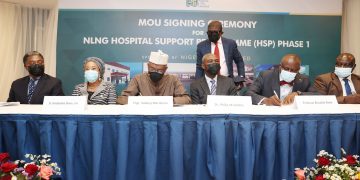More than 18 million deaths are recorded annually from lack of surgical care with Africa housing 25% of global diseases. Amidst this situation, the continent’s populations have, on average, less than 10 physicians per 100,000 people. But there is a silver lining of hope; over 50% of the world population can be assisted from the sea. This means taking the hospital to the needy population residing within 100 miles of the coast. A seagoing vessel equipped with hospital facilities, performing surgeries while bringing recovery and hope to many African families. Mercy Ships have been in this field for over three decades, accomplishing feats that ordinarily, seem miraculous.
According to reports, an estimated 5 billion people around the world lack access to safe surgical care and out of this figure, approximately 1.7 billion of these are children. This burden is felt especially heavily in sub-Saharan Africa, where nearly half the population is under 18.
Another 2021 in four sub-Saharan African nations found that 60-90% of patients in need of surgery would face “catastrophic” costs if they went through with the operation.
In 15 African countries, over 100,000 surgical procedures and more than 8000 professionals trained by Mercy Ships in 30 years of its history of activities in the Continent. These numbers were achieved with two ships. A third ship would soon be added to the fleet to expand the hospital operations of this important voluntary group.
It is an established fact that 80% of the world’s fractures and the majority of club feet occur in developing nations. Without appropriate medical care, those who have these types of defects experience a life of pain and shame. Quite a significant number of children in Africa have benefitted from the benevolent work of this charity and now live a normal life.
They also perform reconstructive plastic surgery on “benign tumours, chronic ulcers, severe wound scars and burn contractures—a tightening of the skin that restricts movement”
The WHO estimates 195,000 deaths occur annually from severe burns and the vast majority of this figure is accounted for by low and medium-income countries.
On 8 April, a ground-breaking agreement between MSC Group with its MSC Foundation and the charity organisation, Mercy Ships International was reached for the construction of a brand-new hospital ship that will deliver free surgery and training annually to thousands of people in Africa. The anchor donation for this project was announced on the same day by the President of MSC Group, Capt. Gianluigi Aponte, Diego Aponte, a member MSC Foundation Board and Don Stephens, the founder of Mercy Ships. This event marks the starting point for the expansion of much-needed surgical procedures to the poor and disease-afflicted African people. The new ship, when completed, will be similarly fitted to the Global Mercy, the flagship of Mercy Ships.
This bequest represents the shipping company’s commitment to supporting access to critical healthcare to the most vulnerable groups in the African nations.
Palliative Care
For many afflicted individuals, the hospital ship and their crew arrive too late and therefore, they are unable to benefit from the physical and medical solutions it brings – their conditions have “progressed beyond the point where medical help will bring healing.”
In several instances, terminal illnesses and suffering from physical, spiritual and emotional pain are collectively felt by the family.
In these cases, Mercy Ships’ Palliative Care Team assists these patients and families during this sensitive time by training family members and caretakers to meet the needs of patients whose ailments have progressed this far. New income opportunities are developed for the families of the dying breadwinner while inviting local religious leaders to support the efforts offering support.
In this regard, there is significantly more that communities and governments in Africa can offer by helping to revive the communal spirit in a sustainable manner. For ages, this coming together in times of need has helped relieve families of pains and economic loss when a breadwinner was unable to cater for the family. On African soil, Mercy Ships is demonstrating to us that this had worked and it is still working.
Collaborators Motivation
According to Capt. Aponte; “I spent part of my childhood and early years in the shipping industry in the Horn of Africa, it is a region close to my heart. I saw firsthand the challenges faced by many local communities there and this shaped my conviction that improving the availability of healthcare would bring real and lasting impact for them. It has been extremely gratifying to work with Don and provide this crucial support through his unique organisation Mercy Ships, our partnership has reaped extraordinary results already and now we are on the verge of expanding their fleet to increase this support. I truly look forward to seeing this new ship set sail to help more communities across Africa.”
Gert van de Weerdhof, CEO of Mercy Ships said: “This new hospital ship will bring state-of-the-art equipment and facilities to support the nations we serve. This new vessel and her future crew will enable us to meet surgical needs while supporting host nations as they develop healthcare systems with their next generation of medical professionals.”
Diego Aponte, MSC Group President and a Member of the MSC Foundation Board, said, “I have always been passionate about Africa and I was struck by the extraordinary and honourable nature of Don’s initiative when it was first presented, and these made me want to be involved in a significant way. Mercy Ships brings tangible and concrete support to thousands of families across the region, and with MSC Group’s major presence there we have to give back to the local communities. This vessel is yet another milestone in our vision to support the African continent with achieving a truly prosperous and sustainable destiny.”
Before expanding the frontiers of Mercy Ship’s charity work in Africa, it bears repeating that investment in the healthcare of people is key to national development and enhanced productivity. Many skills are trapped in people who are impaired by one of the many diseases that incubate on African soil.
The focus of this essay is to highlight the beneficial work of not just Mercy Ships and the pivotal support MSC in this regard but also to call the attention of African leaders and leading multinational entities to this type of CSR which targets people in greater need. Importantly, the integrity of the channel for providing help, in this case, Mercy Ships, is paramount to achieving the goals without the bureaucracy of government institutions. Its operations is purposeful and goal-oriented.
Mercy Ships in numbers and scope
Since its founding in 1978, Mercy Ships has provided more than 117,000 specialised surgical procedures and trained over 54,300 local professionals in their areas of expertise. Yearly, over 3000 volunteer professionals from more than 70 countries serve aboard the world’s two largest hospital ships bringing recovery to thousands of suffering people.
The organization partnered 8 countries during the 2023 activities and executed the following;
- 3,513 surgeries for 3,136 patients
- Trained 93 farmers in nutritional agriculture
- Trained 56 dentists
According to Mercy Ships, these surgeries include “maxillofacial reconstructions, contracture release for severe burns, correction for orthopaedic problems in children, cleft lip and palate repair, ophthalmology and dental services.
Some of the specialist surgeries by the Seaborne charity hospital include maxillofacial surgery for craniofacial tumours, cleft lip and cleft palate, and ear-nose-throat diseases that for decades, are life-threatening conditions for children and adults throughout Africa.
Mercy Ships’ African outreach has also impacted women’s health, especially regarding child delivery complications commonly referred to as vesicovaginal fistulas and rectovaginal fistulas. These chronic conditions caused by lack of access to cesarean sections are prevalent in poor African families and a common factor in the stigmatisation of women. The birth of every child should be joyful and this emotional state should be sustained through appropriate and adequate investment in women’s and children’s health. This is the example that Mercy Ship’s operations in Africa and around the globe call forth.
The Mercy Ships Palliative Care Team assists these patients and families during this sensitive time.
We train family and caretakers to meet the physical needs of these patients. Often, the terminally ill patients are the primary breadwinners of their families. Mercy Ships works with surviving family members to develop new income opportunities. We follow the model of Jesus as we tenderly care for dying patients and their grieving families and we invite local religious leaders to offer spiritual and practical support.
Mercy Ships in Nigeria
Nigeria is not included in the 14 African countries where Mercy Ships operate. Though we do not know the criteria for selecting countries where it sails to deliver surgical assistance to African populations, we may conjecture that security may be tops. There may also be issues with ships navigating to coastal ports, government support, and organizing communities to register these cases. Equally critical to the extension of this type of hospital services is creating awareness and educating communities about these afflictions to dispel superstitious beliefs surrounding some of these diseases.
Although similar programmes exist and are delivered by other non-governmental organisations in partnership with state actors, they are not as elaborate as the procedures delivered by Mercy Ships hospitals.






